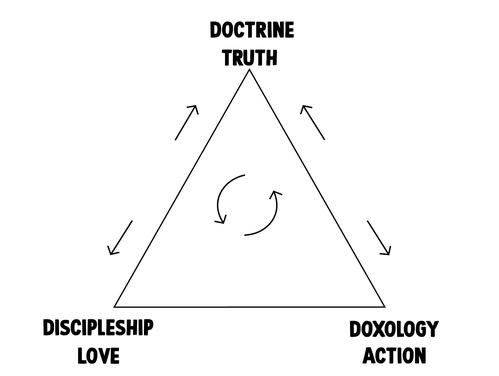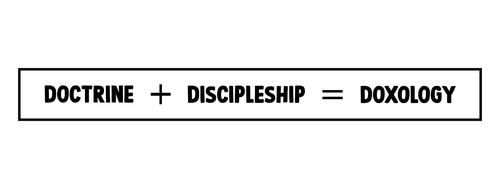The Truth About Dotrine
by Grace Davis, 2021-22 Vector Academy Student
Doctrine—a word tarnished by a cold and rigid reputation, forced to live on the dusty shelves of intellectuals and deemed trivial by most of the world.
And since doctrine surrounds itself with the great names of Christian history (such as Martin Luther, John Calvin, and Saint Augustine) and clothes itself with profound, and at times, abstract terminology like “triperspectivalism,” “eschatology,” and “hamartiology,” most of us tend to file doctrine into a mental box titled, “Confusing! Therefore, Uninteresting!”
It seems like any term typically represented by well-known and well-revered theologians isn’t a practical discussion for the everyday Christian but is, instead, meant to be reserved for the deep meditations of wooly cardigan owners.
Doctrine, however, pertains much more to our daily lives than we realize. It is not a stuffy topic strictly meant for the highly-esteemed theologian. It is, in essence, the very structure shaping all of our worldviews and supplying reason to our core values, our good-Samaritan virtues, and our evangelical actions.
And since doctrine surrounds itself with the great names of Christian history (such as Martin Luther, John Calvin, and Saint Augustine) and clothes itself with profound, and at times, abstract terminology like “triperspectivalism,” “eschatology,” and “hamartiology,” most of us tend to file doctrine into a mental box titled, “Confusing! Therefore, Uninteresting!”
It seems like any term typically represented by well-known and well-revered theologians isn’t a practical discussion for the everyday Christian but is, instead, meant to be reserved for the deep meditations of wooly cardigan owners.
Doctrine, however, pertains much more to our daily lives than we realize. It is not a stuffy topic strictly meant for the highly-esteemed theologian. It is, in essence, the very structure shaping all of our worldviews and supplying reason to our core values, our good-Samaritan virtues, and our evangelical actions.
Somewhere along the fuzzy line of history, doctrine and discipleship found themselves expressed through “cold” and “warm” dichotomies, separating them into seemingly opposite sides of Christianity.
A line was drawn, and a false belief was created: you and I can only choose one or the other– not both.
But if discipleship isn’t supported by doctrine, it isn’t discipleship. Neither is doctrine complete if it doesn’t support discipleship. They need each other to reach their shared goal of worship because, together, doctrine and discipleship establish truth, love, and action, and, together, they bring about doxology, the expression of worship.
They’re a three-in-one pairing, unable to be separated and still maintain their meanings (triperspectivalism!).

While it’s true that doctrine can have its dry and bewildering moments, it plays a crucial role in the very makeup of our faith. Without tackling the WHY’s and the HOW-TO’s of Christianity, how can we share Christ with others?
Jesus perfectly models the two-way dependency of doctrine and discipleship in John 4, when He speaks with the Samaritan woman at the well. As Jesus reveals the woman’s sins and declares that He is the Messiah, He is ultimately establishing the foundation of Soteriology—the Doctrine of Salvation. Soteriology explores what salvation looks like, and it asks how we can be saved: by Whom and by what means. And directly in this text, the Word Himself answers those questions: by confessing our sins and accepting Jesus Christ as Lord over our lives. Thus, we can see that the Doctrine of Salvation (Soteriology) wasn’t man-made; it’s not given its name to express the superhuman thought of some theologian who suddenly figured it all out. Soteriology was born from God’s Word, and He blessed us with the ability to give names to His own creations (Genesis 2:19-20).
Additionally, Jesus reveals to the woman that she doesn’t know, therefore she cannot worship:
Jesus perfectly models the two-way dependency of doctrine and discipleship in John 4, when He speaks with the Samaritan woman at the well. As Jesus reveals the woman’s sins and declares that He is the Messiah, He is ultimately establishing the foundation of Soteriology—the Doctrine of Salvation. Soteriology explores what salvation looks like, and it asks how we can be saved: by Whom and by what means. And directly in this text, the Word Himself answers those questions: by confessing our sins and accepting Jesus Christ as Lord over our lives. Thus, we can see that the Doctrine of Salvation (Soteriology) wasn’t man-made; it’s not given its name to express the superhuman thought of some theologian who suddenly figured it all out. Soteriology was born from God’s Word, and He blessed us with the ability to give names to His own creations (Genesis 2:19-20).
Additionally, Jesus reveals to the woman that she doesn’t know, therefore she cannot worship:
"You worship what you do not know; we know what we worship, for salvation is of the Jews" — John 4:22
To know is doctrine, and we study it to understand more about God, ourselves, and the world. Christ explains that knowing is a foundational base of worship because you cannot worship that which you don’t know. The Samaritan woman was unable to worship the true God or recognize the Messiah because she didn’t know how and, more to the point, she didn’t know Him.
The same logic applies to us. We cannot worship God if we do not study with the intent to know Him. If we do not take into consideration the Who we are worshiping (to not consider doctrine), we are simply failing to worship. If we do not share the knowledge of the Who (to not disciple as the woman does in verses 28-29), we are, again, failing to worship. The three-in-one pairing of doctrine, discipleship, and doxology then crumbles if all three aren’t present.
They are a reflection of the characteristics of the Trinity—one cannot be missing, corrupted, or forgotten without exposing the entirety as false or non-existent. This is another example of triperspectivalism!
The same logic applies to us. We cannot worship God if we do not study with the intent to know Him. If we do not take into consideration the Who we are worshiping (to not consider doctrine), we are simply failing to worship. If we do not share the knowledge of the Who (to not disciple as the woman does in verses 28-29), we are, again, failing to worship. The three-in-one pairing of doctrine, discipleship, and doxology then crumbles if all three aren’t present.
They are a reflection of the characteristics of the Trinity—one cannot be missing, corrupted, or forgotten without exposing the entirety as false or non-existent. This is another example of triperspectivalism!
When we study the unity of things around us with the perspective that all of it was created by a three-in-one God, we begin to recognize Him as Creator and understand more of the Who. If we don’t recognize how creation proves and glorifies God, how are we able to know Who we’re worshiping?
“For since the creation of the world, God’s invisible qualities– his eternal power and divine nature– have been clearly seen, being understood from what has been made, so that people are without excuse” — Romans 1:20
So when you stop and marvel at sunsets and starry skies, you’re not only enjoying God’s creation but witnessing His power and divinity. You’re witnessing doctrine in real-time. Doctrine gives structure to our beliefs; it’s the backbone of our actions as believers.
See, you and I know and rely on doctrine more than we give ourselves credit! And it’s because we, as the Body of Christ, are all theologians (whether we wear wooly cardigans or not).
As Christ-followers, we are called to show our faith by our deeds (James 2:14-25), and with our faith-filled deeds, we are the salt and light of the world (Matthew 5:14-16). Being the salt and light through our good deeds is the premise of the doctrine + discipleship = doxology formula.
See, you and I know and rely on doctrine more than we give ourselves credit! And it’s because we, as the Body of Christ, are all theologians (whether we wear wooly cardigans or not).
As Christ-followers, we are called to show our faith by our deeds (James 2:14-25), and with our faith-filled deeds, we are the salt and light of the world (Matthew 5:14-16). Being the salt and light through our good deeds is the premise of the doctrine + discipleship = doxology formula.

Our biblical knowledge needs to be put into action in the real world with the intention of bringing others to Christ and glory to God. Ultimately, doctrine was never meant to be inactive on dusty shelves or seen as irrelevant to our daily walk with Christ. Doctrine is used. Doctrine is a part of the Gospel, as Jesus shows in John 4; He reveals her sin, reveals she does not know, and then tells her the truth so that she may worship God. He disciples her by explaining doctrinal points and brings her to worship of the Father.
Solid doctrine guides solid discipleship and vice versa.
To exercise the doctrine formula as part of the very first Vector Term, we students were challenged with applying our newfound knowledge of doctrine in a creative project. Not only did we learn the importance of utilizing our biblical knowledge, but proactively used it.
With grateful hearts, we Vecterns want to share with the Grace City Family what we’ve been learning and how God has been using the Lift-Off provisions to forge us into strong and fully equipped leaders.
On behalf of the Vecterns, I thank our church family for your prayers, generosity, and most importantly, your love for God and His Kingdom.
With grateful hearts, we Vecterns want to share with the Grace City Family what we’ve been learning and how God has been using the Lift-Off provisions to forge us into strong and fully equipped leaders.
On behalf of the Vecterns, I thank our church family for your prayers, generosity, and most importantly, your love for God and His Kingdom.
Click the buttons below to enjoy our Vector Doctrine Projects
Created by Students of the Inaugural Class
Recent
Archive
2024
2023
March
April
September
October
2022
April
Jesus vs. The MobThe Murder of GodHometown Easter ROUNDUPNo Town like Hometown: Christmas Edition UpdateChelan County Jail Chaplaincy: Rocket 4Son Mission Hub and Roatan Church Updates: Rockets 2 & 3Publication Platform and GCC Worship: Rockets 7 & 8Vector and Life-Trac: Rockets 5 & 6Construction: Rocket 1Lift Off Mission Update
July
October
December
Categories
Tags
2 Timothy
Acts
Atrium
Baptism
C.S. Lewis
Easter
Esther
Every Good Path
Faith
Farewell
Gospel of Luke
Gospel
Grace City Church Story
Graduation
Holy Defiance
Hope
Jesus
Letter from Josh
Life Plan
Life-Trac University
Lift Off
Manhood
Ministry Updates
Ministry
New Year
No Town Like Hometown
Noble Women
Opening Day
Palm Sunday
Pastor Adam
Pastor Josh
Prayer
Revival
Security
Sermon Series
Stronger Men
The Last Week of Jesus
The Stitch
Tragedy
Transcript
Update
Vector Academy
Watchmen
Womanhood
YouTube
Young Adults
adayinthelife
bibleschool
church
grace city church
lifeplans
pastors
popular
sermons
views
